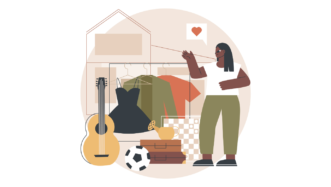LESSON OVERVIEW
The main objectives of this lesson are to:
- expand students’ vocabulary related to Valentine’s Day activities;
- talk about people using personality adjectives and discuss love and friendship relationships.
In this lesson, students expand their vocabulary to talk about Valentine’s Day activities and relationships. They engage in interesting conversations and explore nouns, verbs and phrases related to love, romance and friendship. Students also practise vocabulary to describe steps for dating or friendship app use.
60 minStandard LessonPremium Plan
VALENTINE’S DAY ACTIVITIES
In this activity, students find nouns in a word soup and use them to complete some Valentine’s Day activities (e.g. watch a romantic comedy, send a hand-written love letter, throw a party, etc.). Then, you can ask students about the activities they have done, would never do or would like to try this year.
QUOTES
Students guess the missing words from quotes (e.g. happiness, virus, want, etc.) after they see the first letter of each word. The quotes bring different perspectives on love and Valentine’s Day. Students might choose some quotes, and explain and discuss them.
PERSONALITY
In this activity, students put the letters in the correct order to create adjectives to describe people (e.g. charming, honest, romantic, etc.). You can also ask students to choose three adjectives they think are the most important in a partner or a friend and give examples of the behaviour that the adjectives describe (e.g. My friend is charming because she gives me a lot of compliments.).
DATING AND FRIENDSHIP APPS
In this activity, students choose the correct words to create steps for using a dating app or friendship app. They also put the steps in a logical order. Students might also name things found in these apps and related to them (e.g. information found in a bio, things people look at when they are browsing other people’s profiles, reasons someone might swipe left, etc.).
ROMANTIC RELATIONSHIPS
Students work with more vocabulary and complete the gaps with verbs to create phrases related to relationships (e.g. fall in love, fall out of love, go out, go on a blind date, etc.). You can ask them to work in pairs to create a story using the phrases and the headlines.
Subscribe to unlock these and many other Standalone lesson with the Premium planWORKSHEETS













Comments